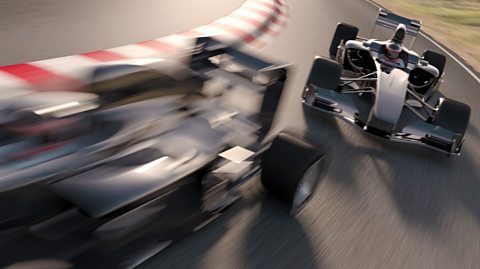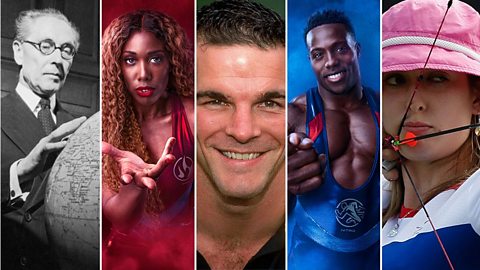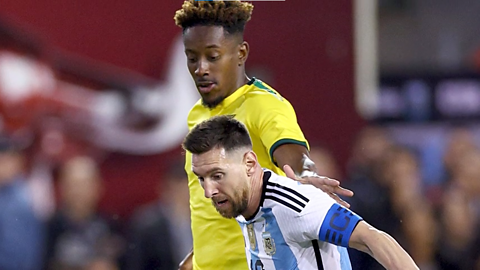With its high speeds and innovative cars, motorsport doesn’t get more prestigious than Formula 1.
In 2023 the international racing competition launched the F1 Academy, an all-female racing series that aims to develop the next generation of talent.
But what is it like to be a woman in F1? BBC Bitesize spoke to some of those who have been a driving force both on and off the track.
Alisha: I'm honestly just a normal girl from Manchester, so to have the opportunity to race in F1 Academy as a support series to Formula 1 on the same race weekend was just incredible.
Kim: Talk to me a little bit about your journey into the F1. What is it that you love about motorsport?
Alisha: My parents have always been huge Formula 1 fans, so just always had it on the telly in the background, and how I got involved in it myself was by complete chance to be honest. I was staying up with my grandparents in Newcastle and they thought, what should we do with her? How should we entertain her? You know, what was a fun thing to do? So they decided to take me go-karting, went in a go-kart for the first time and I got hooked instantly. I was slow, had no idea what I was doing, but I just loved it. And that's where it all really stemmed from.
Kim: And what is it that you love about it then? What really excites you about it?
Alisha: I think at a young age, when I was eight, nine years old, when I started, I think it was the sense of freedom being behind the wheel. When the red lights go out at the start of the race, it was down to me. I was the one in control, just to do the best job that I could. And I really enjoyed that sense of freedom and the feeling when you win as well and succeed, it's the best feeling on the planet and I can't really find a word to describe it, but it's just brilliant.
Kim: And have you any idols in motorsport, is there anyone that you really look up to and admire?
Alisha: One that just seems obvious but jumps out to me is Susie Wolff, managing director of F1 Academy. Without Susie and what she's done with F1 Academy, I wouldn't be sat in this room now in the Red Ball Racing headquarters in Milton Keynes. It's an opportunity I never thought I'd have. And the opportunity that she's given to not just me, but 17 other young females across the whole world. I think it's really going to change the landscape of motorsport for future generations to come.
Kim: Have you had any pinch me moments? Is there one moment where you think, 'oh my goodness, I cannot believe what I am doing right now'?
Alisha: It's been the craziest period of my life, but if I had to pick one specific one, I'd say the Oracle Red Bull Racing brand shoot. That's the first time that I met Max Verstappen, Liam Lawson. Max in particular, he's somebody that I massively look up to, obviously reigning world champion, four time world champion. To see Max walk in the room and just be, I was literally like sat next to him on this picture we had together. It was like, wow, it's incredible. If I could be the first female Formula 1 driver, that would be incredible. But equally, if anybody could do that, that would just be incredible. And I definitely think it's a case of when, not if, to be honest. So hopefully sooner rather than later we'll see it happen.
'It taught me to get my elbows out'
Alisha Palmowski is an 18-year-old F1 Academy driver who is joining the Red Bull Racing Pepe Jeans Academy Programme operated by Campos Racing for 2025. She has been a fan of motorsport ever since she can remember.
She first got involved by complete chance as a child during the summer holidays, when her family decided to take her go-karting. “I was hooked instantly,” Alisha told us. “I was slow, had no idea what I was doing, but I loved it and that’s where it all stemmed from.”
Alisha is poised to complete her first full season in 2025, but made her F1 Academy debut as a wildcard in 2024. “I’m speechless even just talking about it. It’s an opportunity that I thought would never come for me, I’m honestly just a normal girl from Manchester.”
Recalling the experience, which coincided with the main F1 series, she remembers lining up on the grid and coming face to face famous faces, including the seven-time world title winning Lewis Hamilton.
But along with the highs, Alisha also highlights the difficulties she has encountered along the way. “One of the biggest challenges on my [motorsport] journey has been the funding. That’s been a battle,” she said.
Being a young female driver in a male dominated field, is another.
“Maybe some drivers might have treated me differently because I’m a girl. But if anything I think all that taught me to do is to get my elbows out and made me more determined to beat them and do a better job.”
Lucie: People quite often don't believe me. I'll tell them I work at Mercedes F1 and they definitely don't assume I'm an engineer. I immediately get the questions like have you ever been in the car? Anything like that, which I have not.
Kim: Talk to me a bit about what you do do then, because it's more around the internals of the car, right?
Lucie: Yeah. So I work in vehicle thermal performance, as a graduate performance and simulation engineer. So you can kind of imagine as the car is going around the track, it's getting very hot. So part of my job is just making sure it's not getting too hot and it doesn't become a reliability issue.
Kim: What has been your highlight so far?
Lucie: So I got to go to Silverstone. So I got to go down to the paddock on the Thursday before the race, which was really fun. It was kind of nice. I stay at a desk a lot of the time doing my work, so it was nice seeing the car and seeing my work, kind of what I've done and where it actually ended up.
Kim: In terms of any hiccups, have you had any barriers that you found in the workplace or in pursuing your goal to be an engineer?
Lucie: I think before starting, it seems very scary. I think the message that it is intimidating for women in the workplace as an engineer is not something that should be emphasised too much. Everyone's treated the same and you're just a team trying to work together.
Hiran: People will self-select. They might think, for example, Formula is quite an elite sport, it's not for people like me. And we hear students say that all the time, that I'm too scared to apply for it. I'm never going to get there. But actually, you don't know unless you throw your hat in the ring.
Kim: Yeah. And as you say, it's highlighting that you might think, 'oh, I'm from a working class background, it's not for me. Oh, English isn't my first language, it's not for me. I'm a woman, engineering is definitely not for me.' And as you say, that's not the case.
Hiran: We want the best talent from wherever it is, and talent is absolutely everywhere. And we know that diversity in terms of teams brings creative thinking, innovation and ultimately performance. So it gives us an advantage both on and off the track.
Kim: And obviously you've made so many positive changes so far, but what would you like to see the future hold here? And what do you think the future of motorsport could look like?
Hiran: Well, I'm an optimist. So for me, we're bringing in such great diverse talent now, in the years to come, I'd love to see that pipeline of talent develop so that we have more diversity spread across the team. So the young people coming into the team, they can look up and see people like them and feel actually that it is possible to be in that role.
Kim: And if there's a young girl watching this right now, you know, thinking I would like to do what Hiran's doing, I'd like to work in the F1, I'd like to be at Mercedes. What would you say to her?
Hiran: Go for it! There's never been a better time than now to go into engineering. There's so much support out there for you. So seek out those organisations that can support you, and don't let anyone tell you that you can't do it, because you absolutely can!
The next generation of talent
In Northamptonshire, Lucie Jackson, a graduate performance and simulations engineer, tells us that people are often surprised to hear she works in the world of motorsport.
“People quite often don’t believe me, or I’ll tell people I work at Mercedes F1 one and they definitely don’t assume I’m an engineer.” she told BBC Bitesize.
Lucie’s job is to look after the car’s thermal performance, which means making sure it is reliable and doesn’t get too hot whilst on the track.
Before starting her current job, she tells us that engineering seemed scary but her views have since changed.
“I think the message that it’s intimidating for women in the workplace as an engineer, is something that shouldn’t be emphasised too much,” she said.
“Everyone is treated the same and we’re all just a team trying to work together.”
Hiran Odedra, head of inclusion and social impact at Mercedes F1, echoes this message and believes diversity provides an advantage both on and off the track. “People will self-select, they might think that Formula 1 is an elite sport, it’s not for people like me.
“We hear students say that all the time, but you never know until you throw your hat in the ring.”
Hiran encourages students to not let fear hold them back. “We want the best talent from wherever it is,” she tells us. “We know that diversity, in terms of teams, brings creative thinking, innovation and performance.”

Women in F1 milestones
• Maria Teresa de Filippis becomes the first female driver to complete in a Formula 1 championship race - 1958
• Lella Lombardi made history by becoming the first woman to score half a point in Formula 1 in the Spanish Grand Prix - 1975
• Monisha Kaltenborn is appointed by Sauber as the sport's first ever female Team Principal - 2012
• Susie Wolff became the first woman to participate in a Formula 1 weekend since 1992. She later made further practice appearances in an enhanced test driver role - 2014
• Marta Garcia is crowned the inaugural F1 Academy champion, securing 12 podiums on her way to winning the title - 2023

Is the next female driver on the horizon?
Back at the F1 Academy is Katie Denver, a performance and talent development manager who is responsible for making sure the young drivers have everything they need to succeed. This can mean coming up with strategies for everything from nutrition and sleep to emotional management and resilience.
She hopes to see one of the F1 Academy graduates make it all the way up to F1. “I think for me that would be the ultimate level of success.”
When asked about her role models in motorsport, Katie singles out the passion and determination of Susie Wolff, F1 Academy’s managing director.
The sentiment was also shared by Alisha, who said, “Without Susie and what she’s done with the F1 Academy, I wouldn’t be sat in this room now.”
Susie was the last woman to be at the helm of a Formula 1 car, when she raced in a Grand Prix weekend in 2014.
Looking to the future, Alisha is keen to follow in Susie’s footsteps and make history, by becoming a regular fixture on the F1 grid. "If I could be the first female F1 driver that would be incredible,” she told us.
“But equally, if anybody could do that it would be incredible. I definitely think it’s a case of when, not if.”
This article was published in March 2025
A beginner's guide to F1 jargon
What's bottoming? And tankslapping even?

Five athletes who reinvented themselves
They became Gladiators on TV, advocated LGBTQ+ rights, wrote books - and even won the Nobel Prize

'I’m just going to chase Messi around for a bit': Jamal Lowe's journey to the Premier League
Premier League striker Jamal Lowe spoke to BBC Bitesize about his journey from teaching assistant to professional footballer.
